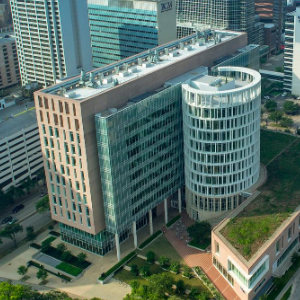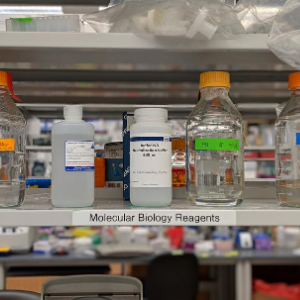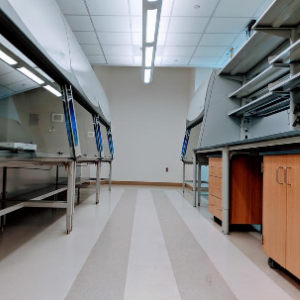The Applied Bioengineering (AB) concentration for the Rice University Master of Bioengineering (MBE) degree is a flexible curriculum for students pursuing careers in academia, medicine or related fields. This concentration can be further enhanced with a course-based or research-based specialization.

Upon completing the MBE degree, students pursuing the Applied Bioengineering concentration requirements will be able to:
- Apply and integrate advanced knowledge of Bioengineering topics in at least one of the following areas: Biomaterials, Biofabrication & Mechanobiology, Biomedical Imaging & Instrumentation, Cellular, Molecular and Genome Engineering & Synthetic Biology, and Computational and Theoretical Bioengineering and Biophysics.
- Apply knowledge from engineering and other disciplines to identify, formulate, and solve novel and complex problems that require advanced knowledge in bioengineering.
- Select and apply quantitative analytic techniques to analyze bioengineering data.
If you have additional questions about the Applied Bioengineering concentration, we encourage you to visit our page of Frequently Asked Questions (FAQ) or the Rice University General Announcements for the Masters of Bioengineering (MBE) degree.
Prerequisite Courses

Both MBE concentrations require prerequisite courses to ensure students are prepared for graduate-level courses in bioengineering. Prerequisite courses for both MBE concentrations are:
- Physiology (or equivalent, 3 credit hours)
- Cell Biology (or equivalent, 3 credit hours)
- Statistics (or equivalent, 1 credit hour)
If a student does not have evidence on their undergraduate transcript that they have received credit for these courses they must take them as part of the MBE curriculum. Prerequisite courses may be taken for a standard letter grade or pass/fail credit, and will not count toward the required 30 hours. All bioengineering courses must be taken for a standard letter grade and all students must maintain an average GPA of 3.0 or higher.
Curriculum
Students in the Applied Bioengineering MBE concentration are required to complete 30 credit hours of upper-level courses, including:
- Eighteen bioengineering credits at the graduate level (500 and above)
- BIOE 627: Medical Technology Design Seminar 1 (1.5 credits)
- BIOE 628: Medical Technology Design Seminar 2 (1.5 credits)
- BIOE 539: Applied Statistics for Bioengineering and Biotechnology (3 credits) OR an alternative quantitative-based BIOE course at the 400-level or above
- One graduate-level elective (3 credits - may be non-BIOE, but must be relevant to bioengineering degree)
- Professional Development elective(s) (3 total credits - 500-level or above, chosen from approved courses listed below).
- Approved Professional Development Electives
-
- Life Science Entrepreneurship (BIOE 633, 1.5 credits)
- Technical and Managerial Communications (ENGI 510, 3 credits)
- Leading Teams and Innovation (ENGI 515, 3 credits)
- Ethics and Engineering Leadership (ENGI 529, 3 credits)
- Strategic Thinking (ENGI 545/LEAD 545, 3 credits)
- Management for Science and Engineers (ENGI 610, 3 credits)
- Leadership Coaching for Engineers (ENGI 615, 3 credits)
- Technology Entrepreneurship (MGMT 734, 3 credits)
- Communication for Engineers (ENGI 542, 3 credits)
- Suggested Curriculum for the specialization in Cell & Gene Therapy
-
Please note: Check the Registrar's Course Schedule. Courses listed are offered in the Fall or Spring (not both), and not all courses are offered every year.
- BIOE 508: Synthetic Biology
- BIOE 522: Gene Therapy
- BIOE 523: Bioengineering Systems & Controls
- BIOE 524: Extracellular Matrix
- BIOE 525: Nanobioeng and Nanomedicine
- BIOE 526: Precision Genome Editing
- BIOE 535: Cell-Based Therapeutics
- BIOE 536: Immunoengineering
- BIOE 537: Genetic and Epigenetic Control
- BIOE 580: Protein Engineering
- BIOE 620: Tissue Engineering
- BIOE 631: Biomaterials Applications
Degree Requirements

The curriculum for both concentrations requires 30 credit hours of study and result in the Masters of Bioengineering (MBE) degree. A minimum of 24 of the 30 credits must be taken at Rice University and all students must maintain an average GPA of 3.0 or higher. Both concentrations have the same prerequisites, though applicants will be evaluated considering the different purposes of each program.
Applicants may apply to both MBE concentrations. Students may enroll for the Applied Bioengineering MBE concentration on a full-time or part-time basis, which includes at least three hours a semester. Students in the Global Medical Innovation MBE concentration are expected to enroll on a full-time basis. All curriculum must be approved by the Graduate Academic Affairs Committee and the Rice University Department of Bioengineering. This is done on a case-by-case basis.
